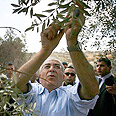
Fayyad: We have undercut pervasive despair
In an article for prestigious US Foreign Policy magazine, Palestinian PM expresses far-reaching optimism over fulfilling vision for budding State. 'We want lasting peace with Israel. But you can't get to that point if everything you do is unidirectionally negative,' says Fayyad
Palestinian Prime Minister Salam Fayyad is looking into the future and it looks bright. In an article he wrote for the prestigious American Foreign Policy magazine, Fayyad states, "It's the power of ideas translated into facts on the ground, taking Palestinian statehood from abstract concept to reality."
Fayyad goes on to enumerate Palestinian achievements: "When we launched our state-building plan for Palestine in August 2009, many dismissed it as an exercise in egg headedness, extraordinary optimism, a dream.
"But here we are, feeling exceptionally, extremely validated by the scorecard so far: We have completed more than 1,500 projects, including the establishment of dozens of new schools, clinics, and housing projects and the construction of new roads throughout Palestine.
"Building a Palestinian state was never intended to replace the political process, but to reinforce, and benefit, from it. The idea was to impart a sense of possibility about what might happen, what we would want to see happen: an end to the Israeli occupation and an opportunity for Palestinians to be able to live as free people in a country of our own.
"Much is wrong with the context in which we're operating. But if we can reduce our problems to just the continuation of the occupation, then we are much better positioned to end it. It's the power of ideas translated into facts on the ground -- taking Palestinian statehood from abstract concept to reality.

Palestinian Prime minister Salam Fayyad (Photo: Issam Rimawi )
"This is hugely political. Yes, it's about technocracy. It's about putting institutions together and getting them to coordinate their activities, getting them to be better able to provide services like medical care and security -- that's what statehood is about.
"But if we manage to create that kind of critical mass of positive change on the ground, I imagine it would be very difficult for anyone looking at us fairly to then still argue that Palestinians aren't capable of managing something that looks like a state."
Two State solution paradox
"Majorities on both sides favor a two-state solution," Fayyad believes. "But there is not a majority on either side that believes a two-state solution will materialize. This is the natural result of 17 long years of the disruption of the political process since the Oslo Accords.
"It's not surprising that people are cynical. I'd argue that the strength of our program derives, at least in part, from its transformative potential, in the sense that it really begins to allow people to see a state in the making -- in a way that grows on them, not happens to them, or for them."
"Often, people come to the conclusion that it's hopeless. I understand that. But they're thinking about things in a static way. The state-building program goes well beyond the world as it is now. You begin to move; you begin to act; you begin to create new realities; and that in itself provides a much better dynamic.
"All this, I believe, feeds into a sense of inevitability that undercuts the pervasive feeling of despair. And this is a state that's going to be founded on the basis of values that are universally shared: openness, tolerance, coexistence, equality, nondiscrimination, and full sensitivity to the rights, needs, and concerns of others. "
- Follow Ynetnews on Facebook










